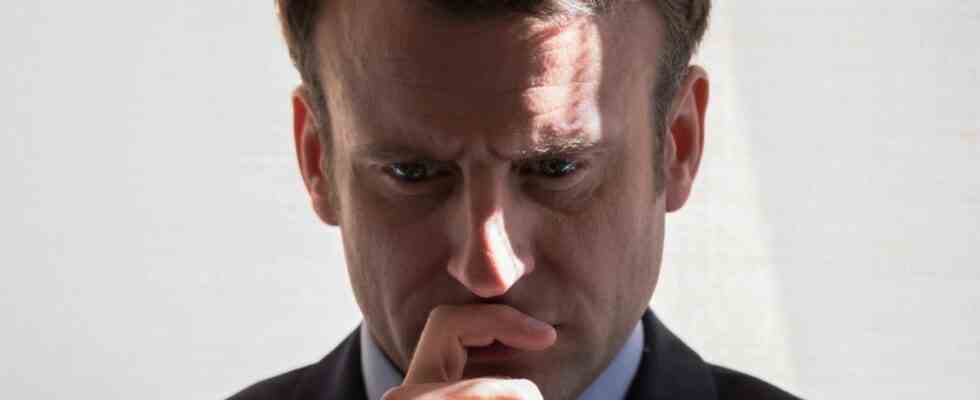The Ensemble party alliance failed to secure an absolute majority in France’s parliamentary elections on Sunday. In Ensemble, the party of President Emmanuel Macron (formerly La République en Marche, today Renaissance) had joined forces with the center party MoDem and the moderately conservative Horizons party. According to the first projections, the ensemble deputies have 234 mandates, for an absolute majority 289 seats would be necessary. For President Macron, this result means a heavy defeat.
During Macron’s first term in office, his party La République en Marche was able to push through the president’s program without much resistance in parliament – because it had an absolute majority there. Macron himself once described his style of government, which relies entirely on an omnipresent president, as “Jupiter-like”, in reference to Jupiter, the supreme god of the Romans. Although Macron was re-elected in the presidential election in April with 58 percent of the vote, his government is now dependent on selective agreements with the opposition to pass legislative proposals.
By far the biggest gain in the parliamentary elections was Marine Le Pen’s far-right Rassemblement National (RN) party. The first projections see the RN at 90 seats. That would be 82 seats more than in the vote five years ago. At the time, not enough RN MPs (formerly Front National) had entered the National Assembly to form their own faction.
Le Pen’s faction is likely to grow even larger than that of the Republicans
This time, however, the faction of the far-right is likely to be larger than that of the bourgeois-conservative forces, which include the Républicains. RN Vice Chairman Jordan Bardella told broadcaster TF1: “This is a tsunami.” Chairwoman Marine Le Pen herself was elected MP in Sunday’s runoff in her constituency in northern France with 62 percent of the vote. Le Pen said on election night that the National Assembly was now becoming “a little more national”.
The main opposition group will be the left-wing Nupes Alliance. According to initial projections, it will have 141 seats. In order to implement the election promise made by Nupes leader Jean-Luc Mélenchon (“I will be prime minister”), the left-green parties would have had to win at least 289 seats together, which would have secured an absolute majority. The Nupes alliance includes Mélenchon’s France Insoumise, the Socialists, the Communist Party and France’s Green Europe Écologie les Verts.
Mélenchon himself will not sit in the National Assembly as he did not run for a seat. Mélenchon spoke on Sunday evening of a “total defeat of the president’s party”. France Insoumise MP Clémentine Autain spoke on Sunday of an “incredible breakthrough” for the left alliance. For the past five years, it has been the right-wing Républicains that have been the primary opposition party in the National Assembly.
Some of Macron’s key allies missed entering parliament on Sunday. Former Interior Minister Christophe Castaner (2018-2020) lost the runoff in his constituency, as did the previous President of the National Assembly, Richard Ferrand. Prime Minister Élisabeth Borne and current Interior Minister Gérard Darmanin, on the other hand, secured their mandates.
Macron’s Environment Minister loses her mandate – and will probably have to resign
15 ministers stood as candidates in the parliamentary elections. Emmanuel Macron linked her stay in government to success in the election. Environment Minister Amélie de Montchalin, who Macron envisaged should have had one of the key roles in the new government, lost her constituency and will have to resign. On the other hand, Europe Minister Clément Beaune, for whom it initially looked very close, managed to enter Parliament on Sunday evening.
Government spokeswoman Olivia Grégoire commented on the election result on Sunday evening: “Are we a bit disappointed? Yes. But have the French made us the strongest group again? Yes.” You will “find ways so that the country is not blocked”.
The newly elected National Assembly reflects the new tripartite division of French politics. President Macron and his supporters mark the center, to his right and left the radical forces have gained a lot. For government work, this means that Macron’s MPs could find themselves wedged between a hard left and a hard right opposition. Political observers fear that the country will become “ungovernable”.
The general election was marked not only by the defeat of Macron, the success of the left and the breakthrough of the far right, but also by a very low turnout. More than half of the French abstained from voting in both the first and second ballots. Voter turnout on Sunday was 46 percent. It was never this low in parliamentary elections in the Fifth Republic.

